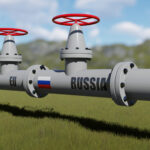Russia’s oil and gas industry faces many obstacles in today’s market, but sanctions may be causing the most damage
For the first time in a decade Russia’s credit rating was downgraded to junk by Standard & Poor’s rating agency last week as the Russian economy continues to weaken under the weight of an increasingly bleak outlook.
Low oil prices have certainly played their part in the worsening economic situation in Russia, but it is far from the most detrimental issue facing the country. That might be hard to believe, considering the oil and gas sector make up 30% of Russia’s GDP, with Rosneft (ticker: RNFTF) alone contributing about a quarter of the entire country’s tax revenue, but the thing hurting the Russian economy more than oil prices, more than oil fields reaching the end of their lifespans and more than problems with the structure of the industry as a whole are the sanctions against Russia for its actions in Ukraine.
Sanctions are cutting Russia off from much needed global investors
In the past, the Russian oil and gas industry has been tremendously dependent on Western lenders, with credit from the West reaching a peak of $660 billion in 2013, according to Vladimir Milov, former Russian Deputy Minister of Energy. “No one in Russia saw this as a problem,” said Milov. “No one imagined that the West would ever stop giving them money.”

Russian companies tried to turn to lenders in China when money from the West was cut off, but the response has been lackluster. Chinese investment has been hard to come by, with many in China saying they do not wish to upset allies in the West.
“If you expect us to rush in and do everything the European and American banks can’t do any more, you will be disappointed,” a Bank of China official in Moscow told Financial Times in October. “We want to develop our Russia business, but we have to consider the risks as well.” The official went on to say that China’s big banks had strategic interests elsewhere and could not afford to be seen helping Russia circumvent U.S. and E.U. sanctions.
All of this is taking place against the background of an increasingly anemic Russian economy, which is burning through its sovereign wealth funds in order to defend the ruble. President Putin said that Russia would not “mindlessly burn up” its reserves, but the government was forced to spend $9.25 billion in January on top of $33.4 billion in December to dampen the blow from a devaluing currency. As of January 30, the Bank of Russia still had $376.3 billion that it is quickly spending in order to stay afloat.
The weakness of the overall economy in Russia has hurt the oil and gas majors in the country badly. Not only are they no longer able to take money from the West, the “Big Three” credit rating agencies have all downgraded the investment grades of many Russian companies due to the political instability in the country. Standard & Poor’s, Moody’s and Fitch have all downgraded Gazprom (ticker: OGZPY), Rostneft and the sovereign state of Russia itself, making them increasingly unattractive investments for anyone.
 As foreign investment continues to remain elusive to Russian oil and gas companies, their problems will only continue to worsen. There will not be enough capital to develop new production as old Soviet brownfields decline, the already cumbersome monopoly structure of the companies will continue to be ineffective and Russian companies will be unable to bear the burden of low oil prices. As bleak as all of that is, sanctions, more than anything else, are strangling the Russian oil and gas industry. “[Sanctions] are extremely important. They are more important than oil prices,” said Milov.
As foreign investment continues to remain elusive to Russian oil and gas companies, their problems will only continue to worsen. There will not be enough capital to develop new production as old Soviet brownfields decline, the already cumbersome monopoly structure of the companies will continue to be ineffective and Russian companies will be unable to bear the burden of low oil prices. As bleak as all of that is, sanctions, more than anything else, are strangling the Russian oil and gas industry. “[Sanctions] are extremely important. They are more important than oil prices,” said Milov.
The full effect of sanctions may not be felt yet, however. With Russia still producing at record levels, and China’s Dagong rating agency giving Gazprom a “AAA” rating allowing the company to list its stock in Hong Kong, it may be some time yet before the real implications of sanctions are felt, but few are optimistic about what the final result will be.
Speaking ahead of the International Energy Agency’s (IEA) Medium-Term Oil Market Report, Laszlo Varro, the head of IEA’s gas, coal and power market division, said that sanctions, along with what he views as a complacent response from Russia regarding the actions being taken against them, are going to cause significant damage to the Russian oil and gas industry. “The Russians of course have a 100-year-old oil industry and they have a lot of technological expertise, but they are not as good as they believe they are. They need Western technology.”
IEA: revising our Russian projections “quite significantly.”
Varro went on to say that the IEA planned to cut its expectations for Russian output in the coming year due to sanctions. “Whereas let’s say a year ago, we were quite optimistic on the ability of Russia to maintain 10 MMBOPD-plus oil production for quite a long time, we are revising our Russian projections negatively quite significantly.”
Important disclosures: The information provided herein is believed to be reliable; however, EnerCom, Inc. makes no representation or warranty as to its completeness or accuracy. EnerCom’s conclusions are based upon information gathered from sources deemed to be reliable. This note is not intended as an offer or solicitation for the purchase or sale of any security or financial instrument of any company mentioned in this note. This note was prepared for general circulation and does not provide investment recommendations specific to individual investors. All readers of the note must make their own investment decisions based upon their specific investment objectives and financial situation utilizing their own financial advisors as they deem necessary. Investors should consider a company’s entire financial and operational structure in making any investment decisions. Past performance of any company discussed in this note should not be taken as an indication or guarantee of future results. EnerCom is a multi-disciplined management consulting services firm that regularly intends to seek business, or currently may be undertaking business, with companies covered on Oil & Gas 360®, and thereby seeks to receive compensation from these companies for its services. In addition, EnerCom, or its principals or employees, may have an economic interest in any of these companies. As a result, readers of EnerCom’s Oil & Gas 360® should be aware that the firm may have a conflict of interest that could affect the objectivity of this note. The company or companies covered in this note did not review the note prior to publication. EnerCom, or its principals or employees, may have an economic interest in any of the companies covered in this report or on Oil & Gas 360®. As a result, readers of EnerCom’s reports or Oil & Gas 360® should be aware that the firm may have a conflict of interest that could affect the objectivity of this report.







